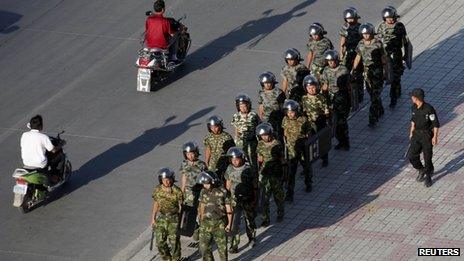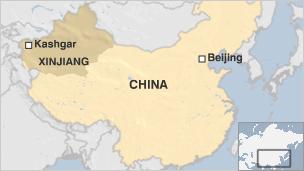China violence: 12 dead in Kashgar city in Xinjiang
- Published

Xinjiang province has had high levels of security since riots in 2009 (file photo)
Chinese state media says 12 people have died in riots near the north-western city of Kashgar in Xinjiang province.
Xinhua news agency reported that rioters killed 10 people, while police shot dead two of the rioters.
The report gives no detail as to what might have triggered the violence.
Security has been high in the north-western province since riots in 2009 in the capital Urumqi between the Muslim Uighurs, who are the largest ethnic group, and Han Chinese migrants.
Nearly 200 people were killed in that unrest, most of them Han, according to officials.
Tuesday's violence took place just after 18:00 in a market in Yecheng county, about 250km south-east of Kashgar, according to Xinhua.
The report said that police were still searching for the rest of the "violent mob", who the report said had been armed with knives.
One local newspaper called the attackers ''terrorists'', saying that they were engaged in criminal activities, reports the BBC's Michael Bristow in Beijing.
A report in the state-controlled Global Times cited a local taxi driver as saying ''the city remained calm''.
A spokesman for the World Uighur Congress, a German-based exile group, said 84 people had been detained and authorities had closed off all exits and entries to Yecheng, citing local sources.
The search terms Yecheng and Kashgar appeared to have been blocked on China's twitter-like weibo microblogs.
Uighur grievances
Almost half of Xinjiang's residents are Uighurs, Turkic-speaking Muslims with cultural and ethnic links to Central Asia.

Many complain that large-scale migration of Han Chinese workers from the east has cost them jobs and is eroding their culture.
China has invested heavily in Xinjiang and the region's rich oil and gas deposits are vital to its booming economy.
Uighur allegations of discrimination and marginalisation have been behind anti-Han and separatist sentiment in Xinjiang since the 1990s.
Further violence broke out in July 2011 and left 32 people dead.
A hostage-taking incident in December led to the death of seven kidnappers - part of a "terror gang", according to Chinese state media.
China claims it faces an organised terrorist threat from radical Muslims in Xinjiang, but Uighur activists say citizens are angry at Beijing's heavy-handed rule in the region.
Authorities announced earlier this month that 8,000 policemen will be recruited for the region in a bid to increase security. The plan would be to station at least one officer in each village.
- Published29 December 2011
- Published25 October 2011
- Published15 September 2011